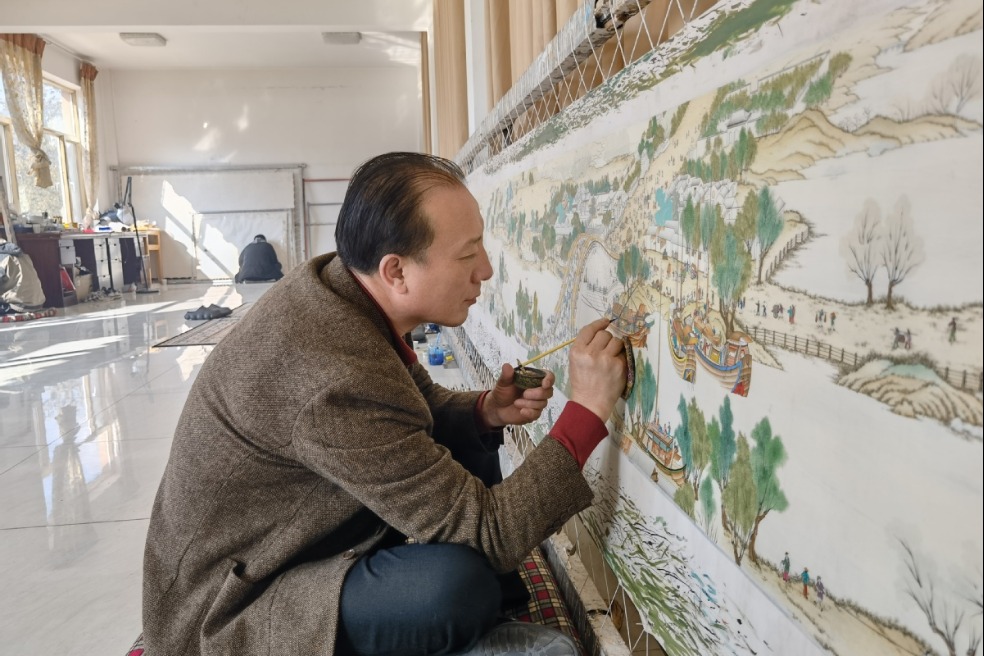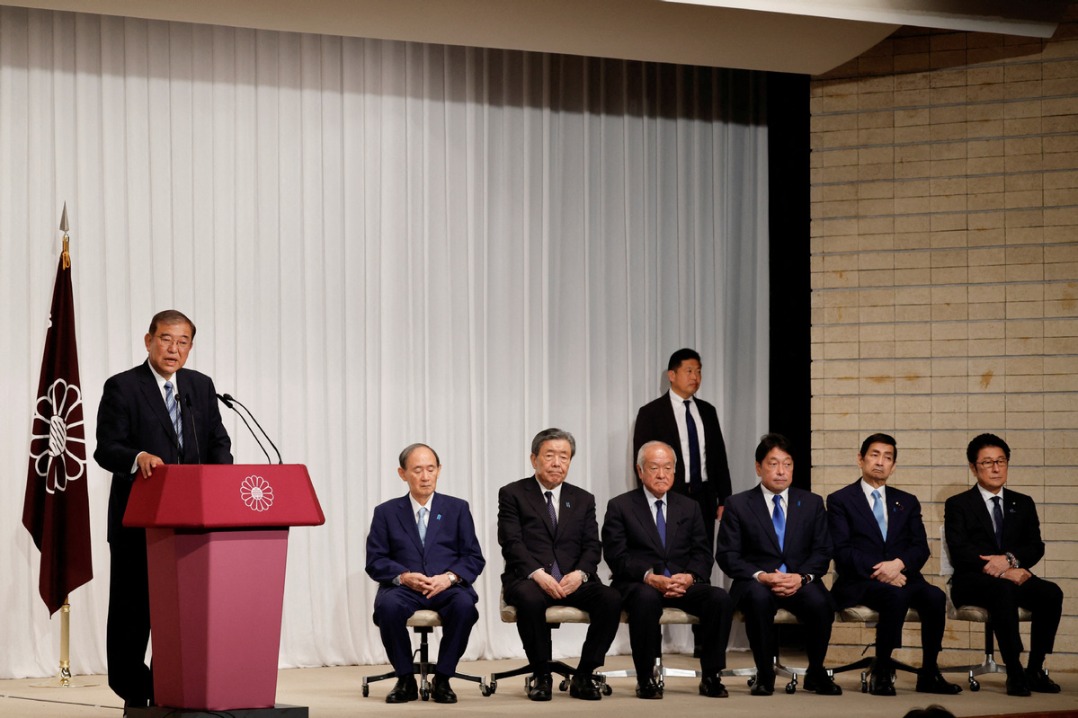Warmly building relations with Argentina


In a Q&A with China Daily, Yang Wanming, China’s ambassador to the South American country hosting the G20 summit explains the growing fondness that Chinese and Argentines have for each other and how trade and exchanges have steadily increased since 1972.
What are the major recent achievements at the top levels in the China-Argentina relationship?
In recent years, the China-Argentina comprehensive strategic partnership has continued to develop in both depth and scope. Over the past two years, President Xi Jinping and President Mauricio Macri have met four times and reached important consensuses on advancing the China-Argentina comprehensive strategic partnership. These exchanges increased mutual trust.
Since the occurrence of financial uncertainty in Argentina this year, President Xi has written to President Macri twice to show strong support for Argentina’s efforts in achieving national stability and development. This highlights China’s confidence in Argentina’s future and in China-Argentina relations.
Under the leadership of the two state heads, the two countries have conducted frequent high-level exchanges and visits. The mechanisms — such as the intergovernmental standing committees, the parliamentary political dialogue and the economic and strategic dialogues — have worked very well. The Argentine side has always adhered to the one-China principle, and China firmly supports Argentina’s sovereignty claims on the Malvinas Islands.
At present, unilateralism and protectionism are on the rise. Developing countries and emerging-market countries are under pressure, and the world economy faces serious risks. China and Argentina are both important emerging-market countries. In this context, both governments have committed to deepening reforms and being more open.
Under the multilateral frameworks of the G20, UN and WTO, both countries promote a multilateral agenda with a global perspective to build an open world economy. Working closely, both endeavor to defend the global multilateral governance system and safeguard the common interests of developing countries and emerging market countries.

cars manufactured by China for Buenos Aires, Argentina in 2017. Martin Zabala / Xinhua
What are the key economic exchanges between China and Argentina?
China and Argentina are indispensable economic partners. Our economic cooperation has been bright lately, with much good news.
In trade, China continues to be the second-largest export destination and import source for Argentina. China is the No. 1 market for Argentine agricultural products. Argentina sends half of its beef exports to China, and the recently signed agreement expanded beef exports to include boned and chilled beef. Negotiations on exporting Argentine mutton, horse, cherries and honey to China are being expedited. I believe more quality Argentine products are going to China.
China, leveraging its own advantages, has actively promoted the interconnection of various e-commerce platforms with Argentine enterprises to allow them to achieve “double expansion” of overseas markets and sales channels. In this year’s “Double 11” shopping festival, 1.52 million Argentine red shrimp were sold in the first hour in China, as much as the sales volume of the whole day over last year.
In investment, as of August 2018, China had invested $15.2 billion in Argentina and created 19,000 jobs. The cooperation fields have expanded from traditional sectors of infrastructure, energy and mining to include new energy, modern agriculture, biotechnology and such emerging fields. The cooperation models extend from traditional engineering contracting to new models such as PPP (public-private partnerships).
The examples are numerous: the Cauchari photovoltaic power station in Jujuy province was contracted to a Chinese company; Biogenesis Bago and a Chinese company jointly opened a foot-and-mouth vaccine lab in China. These joint efforts have helped to fuel social development in both countries.
In the financial sector, the central banks of the two countries have reached an initial agreement on further expanding the volume of their currency swaps. This will not only help Argentina cope with external financial risks, but also demonstrate China’s firm confidence in Argentina’s development prospects.

What are the cultural exchanges between China and Argentina?
Exchanges between people and in literature, art, sports, scientific research and other fields are increasing and bearing fruit in bridging understanding and building friendships.
In tourism, “Argentine fever” continues to heat up in China. From 2015 to 2017, the number of annual Chinese tourists has doubled from 30,000 to 60,000. I believe more and more Chinese will come to Argentina to taste the wines of Mendoza, admire the majestic Iguazu Falls, enjoy the lakes and mountains of the Bariloche, walk on the magnificent Calafate Glacier and take unforgettable selfies at the world’s southernmost “End of the World” city Ushuaia.
Argentina is traditionally a superpower in soccer. Beginning this year, dozens of Chinese youth athletes have received systematic training at Argentine professional clubs. We look forward to “China’s Messi” from Argentina’s training program. Conversely, Argentine tango is becoming more popular in China. According to news media, more than 50 tango clubs have popped up in China. A young Shanghai woman opened a tango dance school after studying tango in Argentina.
Argentines’ enthusiasm for learning the Chinese language continues to grow. Most provinces and cities have established Chinese-language institutions. Every year, more than 3,000 Argentines are studying Chinese, including the children and relatives of many of my Argentine friends. This was unimaginable a few short years ago.
How do the Argentine people view China?
Although China and Argentina are far away, with the rapid development of bilateral relations in recent years, the two countries and the two peoples are getting closer and closer.
Based on my observation, in the eyes of Argentines, China is an ancient civilization, the second-largest economy and a technological power in the world. Its influence on the international stage is very important. More and more Argentines recognize China’s positive role in promoting the development of Argentina and Latin America.
It is worth mentioning that in political, academic and business circles in Argentina, the Belt and Road Initiative is highly regarded. President Macri attended the first Belt and Road International Cooperation Summit. The Ministry of Foreign Affairs, several think tanks and chambers of commerce in Argentina have held Belt and Road workshops in Argentina.
People from various corners of life generally believe that Argentina should take advantage of the rare opportunities extended to Latin America by the Belt and Road Initiative to dovetail the development strategy of Argentina and the Belt and Road Initiative to achieve sustainable development.
How do you view President Xi’s visit to Argentina? How will the visit improve the relationship between the two countries?
The G20 summit will be held in Buenos Aires. President Xi’s attendance at the summit signals strong support for Argentina as the host country.
Moreover, President Xi will send a strong signal to defend the multilateral system and globalization and propose a Chinese plan for the current world economic predicaments. He will build an important consensus to construct the community of humanity’s destiny in order to jointly meet the challenges of global economic risks and achieve inclusive and sustainable growth.
This will be President Xi’s first visit to Latin America since the 19th National Congress of the Communist Party of China. His visit will surely advance China’s relations with Argentina and Latin America to a new level and lead to pragmatic cooperation in various fields.
During the visit, President Xi will exchange in-depth views with Argentine leaders and President Macri to strengthen and set the future cause for the bilateral comprehensive strategic partnership.
The two sides will sign a number of cooperation agreements covering energy, finance, infrastructure, culture, education and other fields, which will further enhance the “sense of gain” between the two peoples on China-Argentina relations.
During preparations for the visit, I have truly felt the eager anticipation of President Xi’s visit to Argentina from all corners in the Argentine community. I am also deeply touched by the efforts and meticulous arrangements made by the Argentine government. I believe that President Xi’s visit will be a total success for both China and Argentina.

































